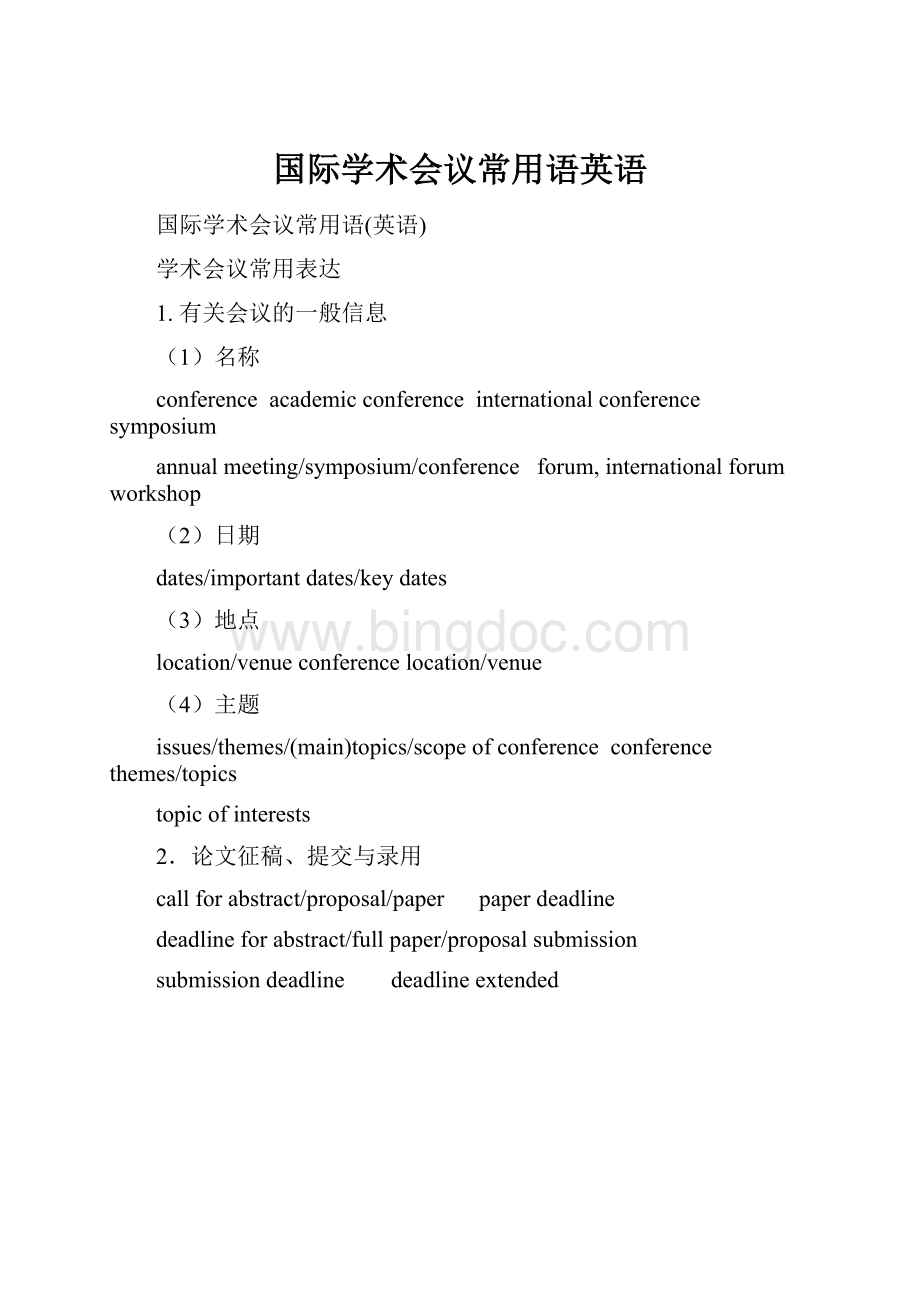国际学术会议常用语英语.docx
《国际学术会议常用语英语.docx》由会员分享,可在线阅读,更多相关《国际学术会议常用语英语.docx(8页珍藏版)》请在冰点文库上搜索。

国际学术会议常用语英语
国际学术会议常用语(英语)
学术会议常用表达
1.有关会议的一般信息
(1)名称
conferenceacademicconferenceinternationalconferencesymposium
annualmeeting/symposium/conferenceforum,internationalforumworkshop
(2)日期
dates/importantdates/keydates
(3)地点
location/venueconferencelocation/venue
(4)主题
issues/themes/(main)topics/scopeofconferenceconferencethemes/topics
topicofinterests
2.论文征稿、提交与录用
callforabstract/proposal/paperpaperdeadline
deadlineforabstract/fullpaper/proposalsubmission
submissiondeadlinedeadlineextended
5.会议具体细节
openingintroductiontospeakertheme/paperpresentation
questionandanswercommentonspeakerclosing
6.学术会议的问答讨论环节口语
学术报告之后的问答讨论环节(QuestionandAnswerSession)是同行之间交流的良好机会,双方可以针对报告中的具体问题进行探讨
(1)答问的方式与技巧
回答讨论环节可以让报告人通过互动及时地获得信息反馈并可以把在讨论中或得的建设性建议用于下一步的工作,因此对科研工作有很大的促进作用。
对于如此重要的环节,报告人在报告之前应进行必要的准备,尽可能地保证这一环节完整、流畅地进行,一般应注意以下几点。
①准备工作
学术报告中的提问者往往是相关领域中的专家,对报告的内容非常熟悉,因此所提出的问题可能会有相当的深度、广度以及不可预见性,有时甚至直接指出研究工作中的不完善之处或漏洞所在。
由于时间关系,回答者在现场一般没有充分的时间进行考虑,这就要求报告人要事先进行充分的准备。
在报告前,报告人应将对答环节的准备作为准备工作的一部分,进行深入考虑,全面的预测听众可能提出的问题,可以假设一些问题,并准备好最合适的解答。
如果会议没有统一安排每个报告的问答环节,报告者在进行报告时就要预先告知听众随后的Q&ASession,这样可以让听众为提问做好准备。
②过程控制
在时间允许的情况下尽可能让每个想提问的人都有机会提问,不要让少数提问者的提问占据整个讨论环节,应按照提问者举手示意的顺序来请出提问者。
在开始回答问题时,首先与提问者目光接触,然后转向其他所有听众,这样可以获得所有听众的注意。
在回答完毕之后,可以再次通过目光了解提问者是否对回答表示满意。
报告人应控制整个讨论的过程,对于与主题无关的问题可以礼貌地回避。
③答问方式
应首先仔细听清问题,在回答之前应将问题清楚的重复一遍,这可以保证对问题的正确理解,确保每个人都能听清楚问题,同时给自己一些时间来思考,表述答案前可做片刻停留,这既引起了听众的注意,又表明了对答案的谨慎态度,同时也给自己留更多的思考空间。
不要对问题进行评价,避免说类似“Thatwasagreatquestion”的话,如果想要对某一问题进行肯定,可以用“Thanksforaskingthatquestion”或“Igetaskedthatquestionbymanypeople.”等中性的表述,还可以让听众感到平等。
回答问题时应尽可能简洁,切题。
在回答中应尽可能多地提及报告中的内容,这有利于听众对报告内容加深印象,并有利于控制问答环节的主题。
④问题的类型
对于寻求具体解释的一些问题,可以简单地重复报告的内容来对问题进行说明或证明,或是澄清听众的误解。
如果提问者对报告内容提出不同见解,可以通过资料、事实、数据等来证明自己的观点,但一定注意态度要礼貌谦和。
对于过于复杂的深层问题无法进行简单回答时,可以在简略回答之后邀约提问者在其他时间进行讨论。
对于听众的评价或是建议应表示感谢,但要控制时间,适时地打断发言人并转入下一个问题。
对不知道答案的问题应坦率的承认,不要回避或转换话题,并尽可能提供相关的书籍,资料或是该方面的专家以供参考。
⑤时间的把握
为了能够巧妙地结束回答问题环节,可事先准备一段总结性的陈述用来重申报告主题并结束问答环节。
注意在达到规定时间时应立刻结束讨论环节,在回答最后一个问题之前们就要礼貌地表示即将超时,并可以让其他提问者将问题留在会后进行讨论。
⑥提问者的礼仪
大型会议中回答环节的时间往往比较短暂,提问者应抓住机会参与讨论,同时应注意以下方面。
如果为提问者准备了麦克风,则应在拿到麦克风后等待阿加安静下来在进行提问;大声地表述,让提问者和听众都能够听清楚问题;不必解释提问的理由以免浪费时间,但如果适宜可以需要地介绍自己(一定要简要);对所提的问题应做好准备,以保证问题的有效性(不要提那些答案显而易见的问题)提问务必简短;每次尽量只提一个问题,把更多的机会留给其他听众。
(2)常用表达
①提问
Iwouldliketoask/address/raiseaquestionabout…
Iwouldliketoknow(whether)…
Iwouldbegladtoknow(whether)…
Ihaveaquestionabout…
MayIask(aquestionabout)…?
Myquestionis/concerns//isconcernedwith…
WhatIwouldliketoaskis…
WhatIamaskingis…
Iwonderifyouwouldliketoexplain/commentonthepointof…
Iwouldbegrateful/appreciate/obliged/for(tohave)someexplanationabout…
Iwonderifyouwouldbekindenoughtoexplain/commenton/givesomeexamplefor…
Iwonder(WhatIamwonderingis)…
Iamcuriousabout/interestedin/keenon(whether/why/how/what/when)…?
Couldyoupleasetellmewhether/why/how/what/when…?
Doyoumindshowingmewhether/why/how/what/when…?
Icouldnotunderstandwhatyoureallymeanby…
Doyouhaveanyideasabout…?
Whatdoyouthinkof/about…?
Couldyouback…up?
Couldyougiveusanexampleabout…?
Couldyouprovideanyexampletoprovewhatyouhavesaidabout…?
Couldyougiveanyexamplethatshows…?
②回答
a.对问题进行确认
Areyouaskingmethequestionabout…?
Iamnotquiteaboutthequestion?
Doyoumean…?
Iamnotquitesurewhatyourquestionis.Couldyouaddressyourquestionmorespecifically?
Whatdoyoumeanby…?
Idon’tknownwhetherIhaveunderstoodyourquestioncorrectly.Doyoumean….?
b.肯定会否定的表示
Yes./Ido.
Theansweris(not)correct/true/right…
Exactly!
Precisely!
Ithinkso.
Ithinkyou’reright.
Idon’tthinkso.
ThatisjustwhatImean.
ThatisnotwhatImean.
I(don’t)believe/consider/suppose/regardtheviewpointistrue.
Sure./Absolutely./Certainly./Definitely.
No,(absolutely/certainly/definitely)not.
I’mincompleteagreement.
I(quite)agree.
Icouldn’tagreemore.
c.正面回答
Myanswer(tothequestion)is…
Toanswerthisquestion,Iwouldliketosaythat…
Thedirect/simple/briefanswertothequestionis…
Letmeansweryourquestionbysameexamplesof…
I’dliketomakeafewcommentson/explanationabout…
IthinkIcangiveyouafewgeneralcommentson/explanationabout…
Tocommentonthequestionofyou,Ihavemadecomparisonbetween…and…
I’dliketopresent/offer/give/express/statemyopinionon…
Inmyopinion,theconclusioncanbesupportedbytheexperimentalresultthat…
Toansweryourquestion,I’dliketorepeatwhatIsaidjustknow.
Ithinkthispicturewillbehelpfulforyourunderstanding.
Here,I’dliketoexplainitbriefly.
Myideaisonthebasisoftwopoints.Thefirstis…,andthesecondis…
Iwillexplainbysomeexamples.
d.非正面回答
NowIcanonlypresentsameestimationaboutthat…
AsfarasIknow,littlein-depthresearchhasbeancarriedoutyet.
Icanonlyprovide/Ihaveonlyapartialanswertothatquestion.
That’sonepossibleexplanation,butnottheonlyone.
I’mafraidit’sabitdifficultformetopresentsomeexperimentaldataatthemomenttosupportthetheorysincemyideaismainlyoutoftheoreticalconsideration.
I’mafraidthequestionistoocomplicatedtobeansweredwithafewwords.I’dliketodiscussitwithyouafterthesession.
Ithinktheanswertothequestionneedssomefurtherstudy.
I’mafraidisnotwithinthefieldofthepresentation.
I’mnotsureifwhatyou’resayinghasanyrelevancehere.
I’mnotsureifwhatyou’resayinghasanythingtodowithourproblem.
I’mnotsureifwhatyou’resayingreallymattersinthiscase.
I’mnotsureifwhatyou’resayingisrelevanttoourproblem.
e.无法回答时的表述
I’msorrymyexperience/knowledgeaboutyourquestionisverylimitedsoIthinkIcannotgiveagoodanswertoyourquestion.
I’msorryIreallydon’tknowtheanswertothequestion.
UnfortunatelyIcannotanswerthequestionatthemoment.
I’mafraidIhavenoideahowtoansweryourquestion(aboutthat).
Sorry,I’mafraidIknowlittleaboutthatmatter,soIdon’tthinkIcanansweryourquestionrightnow.
It’squitedifficultformetoanswerthatquestionnow.
Ican’treallyrecall;I’llhavetogetbacktoyouonthat.
Ican’tquiteremember;I’llneedtodoalittlecheckingandgetbacktoyou.
Ican’tfullyremember;I’llhavetocheckuponit.
Ican’trecallallthefacts;I’llhavetogetbacktoyou.
f.回答之后的表述
Iwonderwhethermyquestionishelpfultoyou.
Doesthatansweryourquestioninarightway?
Ismyexplanationclearenough?
Isthatwhatyouwantedmetoanswer?
Wouldanyoneliketoandanything(towhatI’vesaid)?
Wouldanyonecaretocomment?
Wouldanyoneliketogivetheirideasonthis?
Wouldanyonecaretoaddtheirthoughts(tothediscussion)?